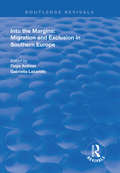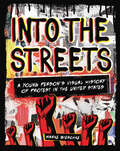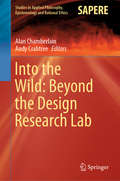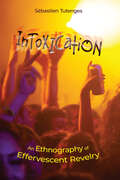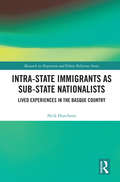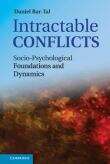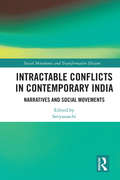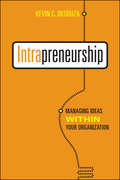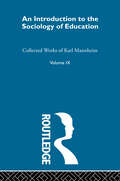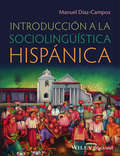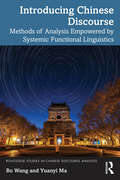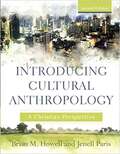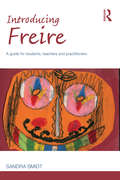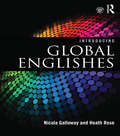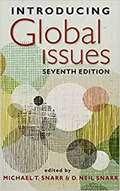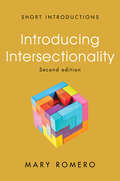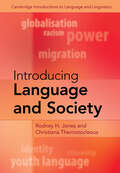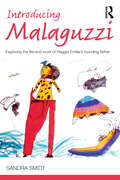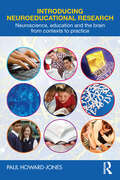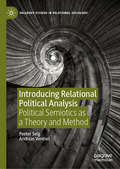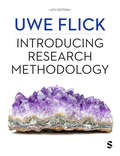- Table View
- List View
Into the Image: Culture and Politics in the Field of Vision
by Kevin RobinsFirst published in 2004. Routledge is an imprint of Taylor & Francis, an informa company.
Into the Margins: Migration and Exclusion in Southern Europe (Routledge Revivals)
by Floya Anthias Gabriella LazaridisFirst published in 1999, this insightful volume thoroughly explores the issue of migration and social exclusion in Southern Europe. It has a number of distinct approaches, including balancing academic research by including the South, reflecting on migration-related policies and a perceptive exploration of the new challenges which face the South. This accessible book will help readers to identify anomalies that lie at the heart of the European Union. On the one hand, unhindered movement of labour is allowed, yet, on the other hand, external frontiers are protected. Borders with Southern Europe allow entry by specific groups of migrants fleeing from their countries (such as the Polish and Albanians who live in Greece) and other illegal migrants. The rationale behind these processes is analysed while keeping in mind societal procedures, such as policy developments, the growth of new forms of xenophobia, exclusion and racialisation of different migrants. Coming at a time when interior ministry officials of the EU member states are pursuing a policy to cut down on third country migrants, this much-needed research sheds light on current political events.
Into the Streets: A Young Person's Visual History of Protest in the United States
by Marke BieschkeWhat does it mean to resist? Throughout our nation's history, discrimination and unjust treatment of all kinds have prompted people to make their objections and outrage known. Some protests involve large groups of people, marching or holding signs with powerful slogans. Others start with quotes or hashtags on social media that go viral and spur changes in behavior. People can make their voices heard in hundreds of different ways. Join author Marke Bieschke on this visual voyage of resistance through American history. Discover the artwork, music, fashion, and creativity of the activists. Meet the leaders of the movements, and learn about the protests that helped to shape the United States from all sides of the political spectrum. Examples include key events from women's suffrage, the civil rights movement, occupations by Indigenous people, LGBTQ demands for equality, Tea Party protests, Black Lives Matter protests, and more, including the George Floyd protests in the summer of 2020. Into the Streets introduces the personalities and issues that drove these protests, as well as their varied aims and accomplishments, from spontaneous hashtag uprisings to highly planned strategies of civil disobedience. Perfect for young adult audiences, this book highlights how teens are frequently the ones protesting and creating the art of the resistance. "[T]he text never loses sight of the fact that the right to assemble and protest is a basic American right. . . . Highly recommended for middle grade through high school collections in both school and public libraries."—starred, School Library Journal
Into the Wild: Beyond the Design Research Lab (Studies in Applied Philosophy, Epistemology and Rational Ethics #48)
by Andy Crabtree Alan ChamberlainThis edited collection opens up new intellectual territories and articulates the ways in which academics are theorising and practicing new forms of research in ‘wild’ contexts. Many researchers are choosing to leave the familiarity of their laboratory-based settings in order to pursue in-situ studies ‘in the wild’ that can help them to better understand the implications of their work in real-world settings. This has naturally led to ethical, philosophical and practical reappraisals with regard to the taken for granted lab-based modus operandi of scientific, cultural and design-based ways of working. This evolving movement has led to a series of critical debates opening up around the nature of research in the wild, but up until now these debates have not been drawn together in a coherent way that could be useful in an academic context. The book brings together applied, methodological and theoretical perspectives relating to this subject area, and provides a platform and a source of reference material for researchers, students and academics to base their work on. Cutting across multiple disciplines relating to philosophy, sociology, ethnography, design, human–computer interaction, science, history and critical theory, this timely collection appeals to a broad range of academics in varying fields of research.
Intoxication: An Ethnography of Effervescent Revelry
by Sébastien TutengesFor two decades, Sébastien Tutenges has conducted research in bars, nightclubs, festivals, drug dens, nightlife resorts, and underground dance parties in a quest to answer a fundamental question: Why do people across cultures gather regularly to intoxicate themselves? Vivid and at times deeply personal, this book offers new insights into a wide variety of intoxicating experiences, from the intimate feeling of connection among concertgoers to the adrenaline-fueled rush of a fight, to the thrill of jumping off a balcony into a swimming pool. Tutenges shows what it means and feels to move beyond the ordinary into altered states in which the transgressive, spectacular, and unexpected take place. He argues that the primary aim of group intoxication is the religious experience that Émile Durkheim calls collective effervescence, the essence of which is a sense of connecting with other people and being part of a larger whole. This experience is empowering and emboldening and may lead to crime and deviance, but it is at the same time vital to our humanity because it strengthens social bonds and solidarity. The book fills important gaps in Durkheim’s social theory and contributes to current debates in micro-sociology as well as cultural criminology and cultural sociology. Here, for the first time, readers will discover a detailed account of collective effervescence in contemporary society that includes: an explanation of what collective effervescence is; a description of the conditions that generate collective effervescence; a typology of the varieties of collective effervescence; a discussion of how collective effervescence manifests in the realm of nightlife, politics, sports, and religion; and an analysis of how commercial forces amplify and capitalize on the universal human need for intoxication.
Intoxication: Self, State and Society
by Thomas Thurnell-Read Mark MonaghanWhat images come to mind when you read the word ‘intoxication’? What behaviour do you associate with the word ‘drunk’? When you hear the word ‘drug’, what images do you recall? This textbook provides an essential and thorough grounding in debates about the role of intoxication in contemporary society, from social and cultural perspectives. It examines intoxication in the broadest sense as including both legal and illegal substances and both culturally accepted and socially stigmatised practices. Given the pace of recent changes in policy and practice – from the increasingly common legalisation of cannabis, to the recent trend of sobriety amongst adolescents and young adults – this book stands out by offering both a through historical and theoretical overview and a topical and forward looking exploration of current debates. It adopts a multi-scale approach to examine wider patterns of change so it considers the subjective experiences of the role intoxication plays in the lives of individuals and groups, in the construction of diverse identities and how this differs by age, gender and ethnicity. The authors play particular attention to the way in which the state justifies interventions based on moral, health and criminal justice discourses and also consider the role played by other individuals and institutions, not least the mass media and the alcohol industry, in propagating and challenging common sense explanations of intoxication. It speaks to undergraduates, master's students and above, with a range of pedagogic features, and offers insights into policy and practice.
Intra-State Immigrants as Sub-State Nationalists: Lived Experiences in the Basque Country (Research in Migration and Ethnic Relations Series)
by Nick HutcheonThis book explores the attitudes, opinions and life experiences of first and second generation intra-state immigrants who are convinced and committed Basque nationalists. Based on in-depth interviews with activists, it challenges many of the assumptions often made about Basque nationalism as an exemplary case of ethnic nationalism in the exclusive sense. Focusing on activists’ migration history, their experiences of social and political inclusion and exclusion, their national and regional identities, their political identities and their experiences of political activism, the author explores the role of origins, identity and life experience in activists’ willingness to engage with Basque nationalism. As such, Intra-State Immigrants as Sub-State Nationalists will appeal to scholars of sociology and politics with interests in migration, national identities and nationalist movements.
Intractable Conflicts
by Daniel Bar-TalThis book provides a comprehensive, interdisciplinary, and holistic analysis of the socio-psychological dynamics of intractable conflicts. Daniel Bar-Tal's original conceptual framework is supported by evidence drawn from different disciplines, including empirical data and illustrative case studies. His analysis rests on the premise that intractable conflicts share certain socio-psychological foundations, despite differences in context and other characteristics. He describes a full cycle of intractable conflicts - their outbreak, escalation, and reconciliation through peace building. Bar-Tal's framework provides a broad theoretical view of the of the socio-psychological repertoire that develops in the course of long-term and violent conflicts, outlines the factors affecting its formation, demonstrates how it is maintained, points out its functions, and describes its consequences. The book also elaborates on the contents, processes, and other factors involved in the peace building process.
Intractable Conflicts in Contemporary India: Narratives and Social Movements
by SavyasaachiThis book attempts a representation of society in contemporary India through an ethnography woven around long-standing intractable conflicts — of displacement and rehabilitation, patriarchy, insurgency and counter-insurgency operations, and climate change. Each chapter in this volume offers a critical transformative narrative in response to these conflicts. It asks how social justice and equality is to be constructed and provides a fresh perspective. It is argued that social movements can no longer be concerned only with itemizing a checklist of demands; it is now necessary to be free of the hegemony of current frames, categories, concepts and principles, and to rethink the ‘promise’. The volume maintains that this effort to step out of the ‘endless waiting’ for delivery of a ‘promised value’ draws out the labour of transformative action. A valuable contribution to understanding social movements in India, this work challenges the established discourses around grassroots politics, progressive policies and legislations as well as radical mass movements. The book will interest students and researchers of social movements, conflict and peace studies, sociology and social anthropology, political science and development studies. It will also be useful to those working in the areas of human rights, social exclusion and inclusive policies.
Intrapreneurship: Managing Ideas Within Your Organization (Rotman-utp Publishing Ser.)
by Kevin C. DesouzaAs an employee, you suspect that your best ideas are valuable and could greatly benefit your organization. Management also recognizes that a company's ability to compete is contingent on how well it leverages its employees' ideas. So, why are individuals at all levels of organizations typically poor advocates for ideas? Intrapreneurship provides an engaging guide for both managers and employees on how to direct the flow of ideas and foster a culture of entrepreneurship within their company's existing structure.Based on Kevin C. Desouza's research and experience consulting with thirty global organizations, Intrapreneurship outlines ways to mobilize all types of ideas - including blockbusters with the potential to create radically new external products and services, and more incremental innovations for improving internal processes. With practical frameworks and real life examples for both employees and managers, Intrapreneurship will help you to identify the value in your own ideas and those of others to ultimately benefit your organization.
Intro Sociol Education V 9
by Karl Mannheim W. A. StewartFirst published in 1962. Routledge is an imprint of Taylor & Francis, an informa company.
Introduccin a la sociolingüstica hispnica
by Manuel Diaz-CamposIntroducción a la Sociolingüística Hispánica es un libro de texto imprescindible para los estudiantes de pregrado que cursan sociolingüística hispánica. Cada capítulo está redactado en un lenguaje sencillo y accesible. Sobre la base de un enfoque pedagógico, cada capítulo incluye una introducción, una lista de los temas a ser discutidos, el desarrollo de tales temas, un resumen, una lista de términos claves, un glosario de la terminología clave, una sección de ejercicios y preguntas de comprensión al final de cada sección temática de cada capítulo.Provee una introducción actualizada sobre los temas más relevantes de la versátil sociolingüística española contemporánea tales como la variación fonológica, el bilingüismo, la lengua y las leyes, las actitudes lingüísticas, entre otrosIncluye una variedad de actividades para apoyar y extender el aprendizaje de los estudiantesOfrece un enfoque pedagógico único que incluye ejercicios de análisis de datos. Estas actividades estimulan la investigación por parte de los estudiantes a través del uso de las bases de datos, la música popular y otros recursos audiovisualesEl libro incluye ejemplos de las variedades de español habladas en el mundo hispanohablante con secciones especiales dedicadas a las variedades habladas en los EEUU Introducción a la Sociolingüística Hispánica is a much-needed undergraduate introduction to the study of sociolinguistics in the Spanish-speaking world. Written in accessible Spanish, each chapter includes an overview, a review of topics, a section of key terms, exercises and questions.Provides up-to-date coverage of the main topics of sociolinguistics - such as phonological variation, bilingualism, and language attitudes - in relation to the Hispanic worldIncorporates a variety of activities to support and extend student's learningOffers a unique pedagogical approach, in which data analysis exercises encourage students to conduct research by using electronic databases, popular music, and audiovisual materialFeatures examples that apply to Spanish varieties spoken around the world, with special sections dedicated to the Spanish varieties of the US
Introducing Chinese Discourse: Methods of Analysis Empowered by Systemic Functional Linguistics (Routledge Studies in Chinese Discourse Analysis)
by Bo Wang Yuanyi MaDrawing on Systemic Functional Linguistics (SFL), this book introduces readers to the methods for analysing discourse/texts written and spoken in the Chinese language. It presents Chinese discourse as a semantic unit, adopting a trinocular view in terms of the hierarchy of stratification. The texts in this book are based on a comprehensive and rich archive, featuring not only text types available in other languages and cultures, but also those unique in the Chinese language. The book is aimed at students and researchers working on SFL, language description, translation studies or related areas, as well as MA or doctoral students who have some basic knowledge about linguistics or discourse analysis.
Introducing Cultural Anthropology: A Christian Perspective
by Brian M. Howell Jenell ParisWhat is the role of culture in human experience? This concise yet solid introduction to cultural anthropology helps readers explore and understand this crucial issue from a Christian perspective. Now revised and updated throughout, this new edition of a successful textbook covers standard cultural anthropology topics with special attention given to cultural relativism, evolution, and missions. It also includes a new chapter on medical anthropology. Plentiful figures, photos, and sidebars are sprinkled throughout the text, and updated ancillary support materials and teaching aids are available through Baker Academic's Textbook eSources.
Introducing Freire: A guide for students, teachers and practitioners (Introducing Early Years Thinkers)
by Sandra SmidtThe famous Brazilian educator Paulo Freire has influenced educators, teachers and students in a broad tapestry of contexts and countries, as he challenged conventional thinking on how teachers ought to teach and learners ought to learn. By making his ideas accessible and relevant, this insightful and thought-provoking text draws out the relevance and topicality of Freire’s work and applies this to a wide range of educational settings, from adult education, through schools, to early years settings. Themes covered include: the lasting impact of illiteracy; the benefits and potential in becoming literate; literacy, language and power; the differences between banking and dialogic education; the social and political nature of learning. what kind of teaching and learning do we want? Using a variety of practical examples and case studies, Introducing Freire is an essential guide to the work of one of the most significant figures in education in the last century. Fascinating and accessible, this book is for anyone interested in teaching and learning, poverty and affluence, power and powerlessness, and society and change.
Introducing Global Englishes
by Heath Rose Nicola GallowayIntroducing Global Englishes provides comprehensive coverage of relevant research in the fields of World Englishes, English as a Lingua Franca, and English as an International Language. The book introduces students to the current sociolinguistic uses of the English language, using a range of engaging and accessible examples from newspapers (Observer, Independent, Wall Street Journal), advertisements, and television shows. The book: Explains key concepts connected to the historical and contemporary spread of English. Explores the social, economic, educational, and political implications of English’s rise as a world language. Includes comprehensive classroom-based activities, case studies, research tasks, assessment prompts, and extensive online resources. Introducing Global Englishes is essential reading for students coming to this subject for the first time.
Introducing Global Issues
by Michael T. Snarr D. Neil SnarrThe half-decade since the 6th edition of Introducing Global Issues appeared has seen enormous th changes in the international arena, perhaps most notably a move away from multilateral approaches to solving global problems―climate change, the covid pandemic, conflict-driven migration, and more. Both the impact of those changes and possible paths to collaborative problem solving are at the center of this new, fully revised and updated edition of the text. The material has been successfully designed for readers with little or no prior knowledge of the topics covered. Each chapter provides an analytical overview of the issue addressed, identifies central actors and perspectives, and outlines past progress and future prospects. Discussion questions are posed to enhance students’ appreciation of the complexities involved, and suggestions for further reading additionally enrich the text.
Introducing HR Analytics with Machine Learning: Empowering Practitioners, Psychologists, and Organizations
by Christopher M. Rosett Austin HagertyThis book directly addresses the explosion of literature about leveraging analytics with employee data and how organizational psychologists and practitioners can harness new information to help guide positive change in the workplace. In order for today’s organizational psychologists to successfully work with their partners they must go beyond behavioral science into the realms of computing and business acumen. Similarly, today’s data scientists must appreciate the unique aspects of behavioral data and the special circumstances which surround HR data and HR systems. Finally, traditional HR professionals must become familiar with research methods, statistics, and data systems in order to collaborate with these new specialized partners and teams. Despite the increasing importance of this diversity of skill, many organizations are still unprepared to build teams with the comprehensive skills necessary to have high performing HR Analytics functions. And importantly, all these considerations are magnified by the introduction and acceleration of machine learning in HR. This book will serve as an introduction to these areas and provide guidance on building the connectivity across domains required to establish well-rounded skills for individuals and best practices for organizations when beginning to apply advanced analytics to workforce data. It will also introduce machine learning and where it fits within the larger HR Analytics framework by explaining many of its basic tenets and methodologies. By the end of the book, readers will understand the skills required to do advanced HR analytics well, as well as how to begin designing and applying machine learning within a larger human capital strategy.
Introducing Intersectionality
by Mary RomeroHow can we hope to understand social inequality without considering race, class, and gender in tandem? How do they interact with other categories such as sexuality, citizenship, and ableism? How does an inclusive analysis of domination and privilege move us closer to solutions touching the lives of diverse populations? In this updated edition of her popular introduction, Mary Romero presents intersectionality as a core facet of the sociological imagination. One-dimensional approaches are no longer acceptable: we must examine all systems of oppression simultaneously, and how they integrate and work with or against each other to shape life experiences. Recognizing the dynamics of patriarchy, capitalism, and white supremacy, Romero shows how social inequality is maintained or minimized in various social settings and interactions. The new edition is updated with the latest literature and theoretical insights, as well as addressing contemporary political issues and conservative backlash, from immigrant detention and abortion restrictions to attacks on Critical Race Theory. Offering an overview of scholarly and activist tradition in the development of intersectionality as a lens to enrich our understandings of social life, this introductory text will be an invaluable and welcome resource for all students of sociology.
Introducing Language and Society (Cambridge Introductions to Language and Linguistics)
by Rodney H. Jones Christiana ThemistocleousThis accessible and entertaining textbook introduces students to both traditional and more contemporary approaches to sociolinguistics in a real-world context, addressing current social problems that students are likely to care about, such as racism, inequality, political conflict, belonging, and issues around gender and sexuality. Each chapter includes exercises, case studies and ideas for small-scale research projects, encouraging students to think critically about the different theories and approaches to language and society, and to interrogate their own beliefs about language and communication. The book gives students a grounding in the traditional concepts and techniques upon which sociolinguistics is built, while also introducing new developments from the last decade, such as translanguaging, multimodality, superdiversity, linguistic landscapes and language and digital media. Students will also have online access to more detailed examples, links to video and audio files, and more challenging exercises to strengthen their skills and confidence as sociolinguists.
Introducing Malaguzzi: Exploring the life and work of Reggio Emilia’s founding father (Introducing Early Years Thinkers)
by Sandra SmidtLoris Malaguzzi is recognised as the founder of the extraordinary programmes of preschool education that developed after the war in Reggio Emilia, Italy. Deeply embedded in the cultures and communities they serve, these unique preschools have justifiably become famous throughout the world. In this accessible and engaging text, Sandra Smidt examines how Malaguzzi’s philosophy developed out of his personal experiences of growing up in post-fascist Italy. His ideas are explored and illustrated throughout by examples relating to everyday early years practice. The key themes explored include: relationships — the importance of relationships, culture and contexts to learning within any setting and beyond; transparency — the importance of listening and documentation to understanding and sharing learning; questioning — inviting children to not only answer questions but raise them, allowing them to be equal partners in all learning situations; creativity — finding ways of enabling children to use all the expressive languages they can find to express and share their ideas; equity and fairness — involving the community in all decision-making and discussions, to ensure that early childhood education is accessible and relevant to all children.? This book will be of benefit to all those working with young children and essential reading for students on early childhood education programmes.
Introducing Neuroeducational Research: Neuroscience, Education and the Brain from Contexts to Practice
by Paul Howard JonesAmongst educators, scientists and policy-makers there is a growing belief that the field of education can benefit from an understanding of the brain. However, attempts to bring neuroscience and education together have often been hampered by crucial differences in concepts, language and philosophy. In this book, Paul Howard-Jones explores these differences, drawing on the voices of educators and scientists to argue for a new field of enquiry: neuroeducational research. Introducing Neuroeducational Research provides a meaningful bridge between two diverse perspectives on learning. It proposes that any such bridge must serve two goals that are critically related to each other: it must enrich both scientific and educational understanding. This challenge gives rise to unique conceptual, methodological and ethical issues that will inevitably characterise this new field, and these are examined and illustrated here through empirical research. Throughout the book, Paul Howard-Jones: Explores ‘neuromyths’ and their impact on educational research Highlights the opportunities to combine biological, social and experiential evidence in understanding how we learn Argues against a ‘brain-based’ natural science of education Introduces clearly the concept of an interdisciplinary neuroeducational approach Builds a methodology for conducting neuroeducational research Draws on case studies and empirical findings to illustrate how a neuroeducational approach can provide a fuller picture of how we learn. Presenting a blueprint for including our knowledge of the brain in education, this book is essential reading for all those concerned with human learning in authentic contexts: educators, scientists and policy-makers alike.
Introducing Neuroeducational Research: Neuroscience, Education and the Brain from Contexts to Practice
by Paul Howard JonesAmongst educators, scientists and policy-makers there is a growing belief that the field of education can benefit from an understanding of the brain. However, attempts to bring neuroscience and education together have often been hampered by crucial differences in concepts, language and philosophy. In this book, Paul Howard-Jones explores these differences, drawing on the voices of educators and scientists to argue for a new field of enquiry: neuroeducational research. Introducing Neuroeducational Research provides a meaningful bridge between two diverse perspectives on learning. It proposes that any such bridge must serve two goals that are critically related to each other: it must enrich both scientific and educational understanding. This challenge gives rise to unique conceptual, methodological and ethical issues that will inevitably characterise this new field, and these are examined and illustrated here through empirical research. Throughout the book, Paul Howard-Jones: Explores ‘neuromyths’ and their impact on educational research Highlights the opportunities to combine biological, social and experiential evidence in understanding how we learn Argues against a ‘brain-based’ natural science of education Introduces clearly the concept of an interdisciplinary neuroeducational approach Builds a methodology for conducting neuroeducational research Draws on case studies and empirical findings to illustrate how a neuroeducational approach can provide a fuller picture of how we learn. Presenting a blueprint for including our knowledge of the brain in education, this book is essential reading for all those concerned with human learning in authentic contexts: educators, scientists and policy-makers alike.
Introducing Relational Political Analysis: Political Semiotics as a Theory and Method (Palgrave Studies in Relational Sociology)
by Andreas Ventsel Peeter SelgThis book introduces relational thinking to political analysis. Instead of merely providing an overview of possible trajectories for articulating a relational political analysis, Peeter Selg and Andreas Ventsel put forth a concrete relational theory of the political, which has implications for research methodology, culminating in a concrete method they call political form analysis. In addition, they sketch out several applications of this theory, methodology and method. They call their approach “political semiotics” and argue that it is a fruitful way of conducting research on power, governance and democracy – the core dimensions of the political – in a manner that is envisioned in numerous discussions of the “relational turn” in the social sciences. It is the first monograph that attempts to outline an approach to the political that would be relational throughout, from its meta theoretical and theoretical premises through to its methodological implications, methods and empirical applications.
Introducing Research Methodology: Thinking Your Way Through Your Research Project
by Uwe FlickNew to research? This book helps you understand, think about and interpret each stage of the research process before you dive in. The holistic coverage helps you ′think through′ each step, from formulating questions and selecting methods to collecting data and analyzing results. With new content on the ethics of digital research, online interviews and data protection, you will also find: 10 new Student Research Spotlights that demonstrate how you can foster a reflexive mindset; A strong emphasis on social justice, including principles for culturally-responsive research and methodologies that challenge colonial perspectives; 34 case studies of real-world research that apply theory to global contexts, from Portugal to Germany to Canada. This new edition is essential for any undergraduate or postgraduate student looking to conduct social research with confidence and capability.

